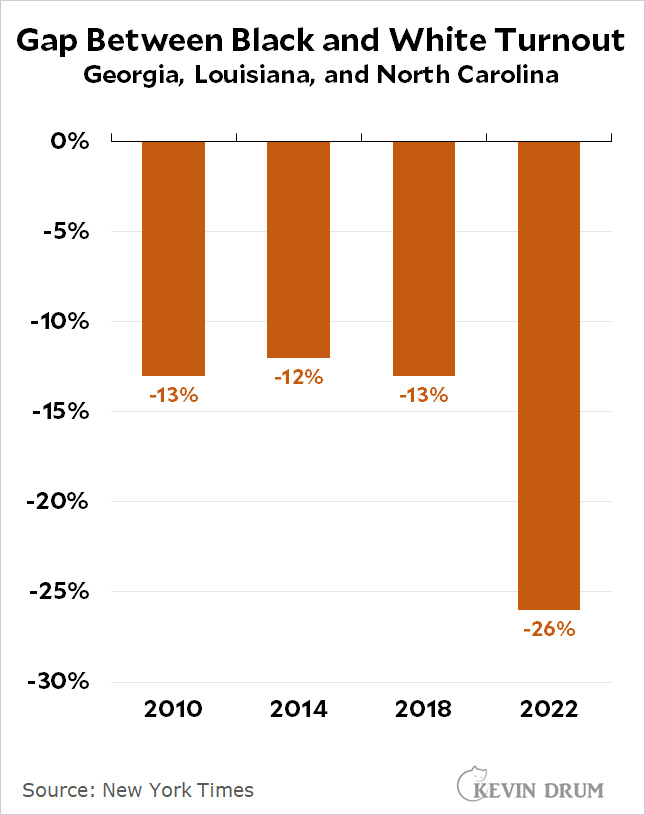 A few days ago James Carville made some news by telling New York Times columnist Charles Blow that the biggest story of the 2022 election was "abysmally low Black turnout," especially among young Black voters.
A few days ago James Carville made some news by telling New York Times columnist Charles Blow that the biggest story of the 2022 election was "abysmally low Black turnout," especially among young Black voters.
Is this true? According to a Times analysis published last November, it's true in at least three Southern states where we have solid data. In Georgia, Louisiana, and North Carolina collectively, the gap between Black and white turnout was 26%, about double what it was in the three previous midterm elections. We will presumably get good survey data for the other states eventually, but I don't know when. ANES only covers presidential years and I haven't heard anything from folks like Catalist that have analyzed previous midterm elections.
All politics is local, and three Southern states don't necessarily represent a widespread problem. But they might. Surely someone has updated information about this by now?

Three seems to indicate a widespread problem.
Google paid 99 dollars an hour on the internet. Everything I did was basic Οnline w0rk from comfort at hΟme for 5-7 hours per day that I g0t from this office I f0und over the web and they paid me 100 dollars each hour. For more details
visit this article... https://createmaxwealth.blogspot.com
I can speak to North Carolina's dreadful performance in the 2022 election, where the state and local Democratic Party failed in their job in several ways, including but definitely not limited to turnout (particularly among Black voters).
The state party has new leadership, which may help in 2024 but, on the other hand, Republicans have veto-proof majorities in the General Assembly, and will do who-knows-what to limit turnout next year and to gerrymander even more power for themselves.
We need more data and the data from the individual states. Conflating Georgia with Louisiana? Also, I know election participation has been growing so maybe blacks are still turning at the same rates and it just that the white Trumpian and anti-Trumpian vote has goosed up things?
Maybe the disenfranchisement efforts are finally working in those states? I mean, if you close most of the polling places and make it harder than it has been for decades for voters to register... eventually you would expect to see a decline in voter participation, right? It appears Art Pope and his ilk are finally getting returns on their investment in the Republican Party's efforts to kill democracy among people of certain skin tones...
Funny thing is, you can see the same sudden drop off in black people voting after Reconstruction ended 150 years ago... suddenly all the black politicians lost their elections. Weird how instituting Jim Crow laws led to a sudden whitening of Southern legislatures all at once! I guess the blacks of that era didn't vote hard enough to stay in office?
This was my first thought. Make it hard enough for black voters to vote, and many won't.
Gerrymandering hurts too--why vote if it basically won't count?
That too. Corral almost all the black people into a few districts, and voting for them becomes individually pointless most of the time: the ones in the corralled district know their preferred local/state candidates are going to win anyway so why bother voting, and meanwhile the isolated ones surrounded by tons of white people know their preferred candidates have zero chance of winning so… again why bother voting. It’s not like voting is a task that costs the voter nothing in terms of both time and money - lots of people have to actively take time off work, travel, find babysitters or bring the kids with them, etc. in order to vote in person on Election Day (which increasingly is the only way to vote in redder states). If you *know* your vote no longer matters because of gerrymandering… why incur all those costs?
The Kevin Drums of the world though never appreciate just how much voting actually costs individual voters, especially at the bottom of the pay scale, and how much individual voters are unwilling to pay that cost if institutional impediments like gerrymandering mean they essentially get no value back for deciding to vote. It’s completely economically rational to not vote if your vote isn’t going to matter.
A tad different as the KKK (in general) isn’t around to lynch you for exercising your right to vote. Larger point that the disenfranchising may be working is surely valid.
The Democratic party is the party of college educated whites. Education remains the biggest predictor and this applies even to non-whites. It's not a surprise to me that enthusiam in a population with less college is down in a college based party.
Whenever you have a gap between two groups, you need to make sure that the widening of the gap isn't due to an increase in one group before concluding there is a decrease in the other. If white voters substantially increased, that would widen the gap without any change in black voting. I find it odd that this is being presented in terms of a gap and not simply two lines in a graph, so that we could see which groups were increasing or decreasing.